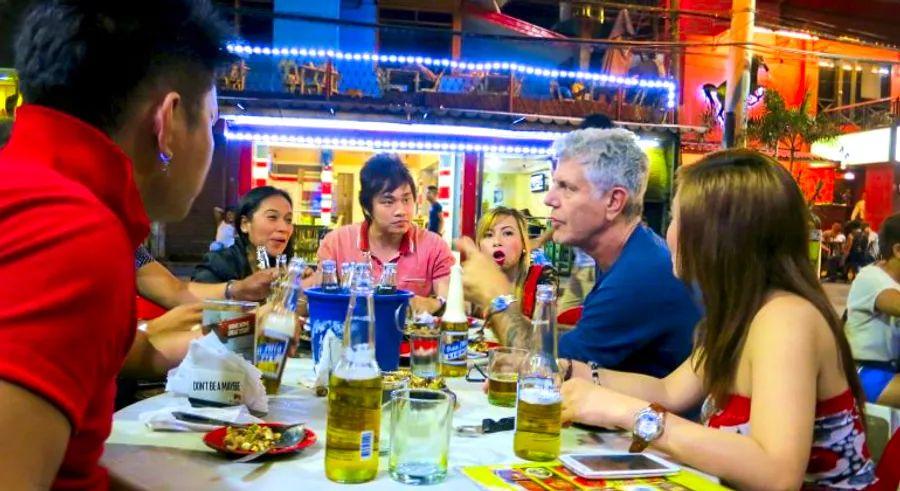Bourdain: What makes Filipino workers so warm-hearted and generous?

Tagalog, the language spoken in the Philippines, is a familiar sound in my home. Like many children worldwide, my daughter came home from the hospital to find a Filipino nurse by her side.
Vangie was there from the start, and over time, my daughter grew close to her son, daughter-in-law, and their child. She was introduced to an extended family across New Jersey, Southern California, and the Bay Area. But most importantly, she bonded with Jacques—Vangie’s grandson and her best friend since childhood—partners in mischief and inseparable companions.
If I flip through old photo albums now, it’s clear—half of the pictures feature the two of them together.
We celebrated holidays like Thanksgiving, Christmas, New Year's, birthdays, and vacations side by side. Our families flowed in and out of each other's homes, a constant exchange. Over time, I began to notice certain aspects of Filipino life that I felt were worth exploring further.
Singing is a constant in our lives—it's like a tradition that’s been passed down to my daughter. Family and church, too, play a significant role (even in my otherwise non-religious home). And, of course, there's the food.
My daughter is well-versed in Filipino dishes like sisig, sinigang, and adobo, and she looks at me with disdain when I can’t get her the same Filipino pastries and breads she enjoys at her other family's house. She’s learned a few Tagalog phrases and gives me a sympathetic look when I can’t keep up with her.
Around here, nothing is wasted. Any item, no matter how small, that might be useful to someone back home gets packed into a big box and shipped across the world—whether to family or someone in need.
But why do Filipinos care so much?
So, here’s the real focus of this episode. It’s NOT about the Philippines itself. With over 7,000 islands, I’m sure I’ll never see even a fraction of them. It’s not even entirely about Filipinos—my personal experience is too limited to generalize. And as it happened, our plans to venture beyond Manila were interrupted by a typhoon.
This episode aims to explore why so many Filipinos are incredibly compassionate. Why they care so deeply—for each other, and even for strangers. My own experience isn’t unique. Thousands, perhaps millions, of children have been raised by Filipino nannies—many of whom are mothers who had to leave their own children behind in the Philippines.
Filipinos work in many roles—doctors, nurses, housekeepers, babysitters—and in every case I’ve encountered, these ‘caregivers’ go beyond the job title. They truly care. But where does this kindness, this deep-rooted instinct for charity, come from?
Going abroad to care for others is a major contributor to the Philippine economy. Overseas workers play a crucial role in supporting their families back home. The government can’t always be relied upon, so Filipinos have had to master the art of survival on their own—and often, of rising up in the face of adversity.
This spirit of self-reliance is visible all over Manila—whether in the makeshift Jeepneys that transport people to work, or in the humble homes in poorer neighborhoods. They may be built from scraps of wood, but they are kept clean, adorned with flowers or festive decorations. It’s about making the best with what you have.
It’s personal.
Not everyone in the Philippines faces such limited choices, I should emphasize. But it’s the story of the overseas workers—and the families they’ve left behind—that I find most compelling in this episode. You could say it’s personal.
In this episode, you’ll meet one woman—just one (though there are many like her)—who, after 30 years abroad and separated from her children, has helped raise dozens of people. She put them through school, helped improve their lives, and built homes—before finally returning to her own now-middle-aged children. It’s an extraordinary story, though far from unique.
There was another topic I needed to look into.
For years, wherever I travel—whether it’s hotel bars in Chiang Mai, lobbies in Singapore, or lounges in Colombo, Kuala Lumpur, and Hong Kong—I find Filipino cover bands that can flawlessly play 'Dark Side of the Moon,' then seamlessly move on to 'Happy Birthday' (in English, German, or Cantonese), followed by Patsy Cline, Celine Dion, and then ‘Welcome to the Jungle.’
I had to dig deeper. Where do they all come from? I hope the overseas Filipinos and our fans in the Philippines will enjoy this episode even more than the last one we did on our other show. This certainly isn’t the definitive show on the Philippines, but it won’t be our last one either.
I have a feeling there will be tears this time. At least, I hope there will be. We’ve made an effort to honor those who have been incredibly kind to us.

1

2

3

4

5
Evaluation :
5/5